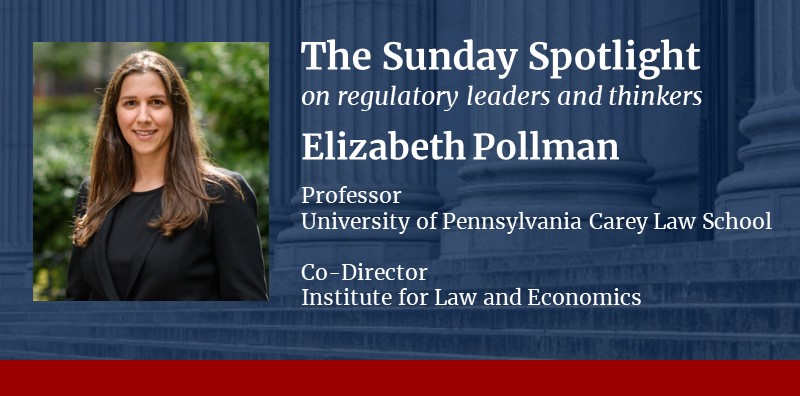
Elizabeth Pollman explains how venture-backed startups present opportunities for society but also regulatory challenges.
In light of prominent failures of startups such as Theranos, WeWork, and FTX, The Regulatory Review reached out for perspective to Elizabeth Pollman, a professor of law and co-director of the Institute for Law & Economics at the University of Pennsylvania. Pollman offered her thoughts on the role of startups in the economy as well as on the use of a strategy that Pollman has called regulatory entrepreneurship.
Startups become regulatory entrepreneurs—or “agents of legal change”—by seeking to change the law or create new laws. Sometimes legal change becomes part of startups’ particular business plans, with companies such as Uber mobilizing their users for political support and regulatory power.
The vast majority of startups fail, however, generating headlines and regulatory concerns. Through her research, Pollman addresses the implications of startup failure for businesses’ regulatory environments.
Pollman has published multiple papers at the intersection of business and law, including the role of venture capital and entrepreneurship on business regulation, lobbying, and governance efforts. While at Penn, Pollman has received the Harvey Levin Memorial Award for Teaching Excellence and the LLM Prize for Excellence in Teaching. Pollman has also served on the ABA Corporate Laws Committee and is a research member of the European Corporate Governance Institute.
She practiced at Latham & Watkins in Silicon Valley and served as a law clerk for the Honorable Raymond C. Fischer of the Ninth Circuit Court of Appeals. Pollman received her Bachelor of Arts in Anthropology from Stanford University with distinction. She returned to Stanford for law school, earning her J.D. with distinction as a member of the Order of the Coif. She then went on to become a fellow at the Rock Center for Corporate Governance at Stanford Law School.
The Regulatory Review is pleased to share the following interview with Elizabeth Pollman.
The Regulatory Review: Can you describe what “regulatory entrepreneurship” is and how venture capitalists might influence the regulatory strategies of the startups they invest in?
Pollman: My co-author Jordan Barry and I use the term “regulatory entrepreneurship” in our article to describe companies that pursue a line of business in which changing the law is a significant part of the business plan. Some recent notable examples have been Uber, Airbnb, and Tesla. Regulatory entrepreneurship is not limited to startups, but we observe that well-funded, scalable, and highly connected startups with mass appeal have advantages for this kind of activity. Regulatory entrepreneurs are innovators, and one of the key tactics they often use is “blitzscaling” and trying to grow “too big to ban” before regulators take action against them. Changing the law is also often a highly uncertain proposition, and startups and the venture capitalists who fund them may be inclined to take on this uncertainty if there is a large business opportunity.
TRR: Your article on regulatory entrepreneurship discusses startups as operating in “legal gray areas.” Have recent startup failures affected the tolerance of legal ambiguity by regulators and by the public?
Pollman: There have certainly been some big, salient examples recently of failed startups that operated in legal gray areas or even stepped over the line. Regulators are becoming more attuned to the risks posed by startups pushing the envelope, but they still face challenges keeping up to speed with developments and figuring out how to navigate the timing problem of regulating innovation. Meanwhile, the public holds a wide range of views depending on the startup or technology. We have witnessed the ups and downs of Theranos, WeWork, FTX, and more, and today the public shares in both excitement and concern about new technologies such as AI that pose a host of legal issues.
TRR: FTX has grabbed headlines with its bankruptcy. How typical is it for venture-backed startups to use the formal bankruptcy process? Why do we not see this more often?
Pollman: For many insolvent or financially distressed businesses, bankruptcy provides an important process for preserving going-concern value or liquidating efficiently under the supervision of a bankruptcy trustee or court. Despite failing at high rates, however, venture-backed startups rarely use formal bankruptcy.
For my article, Startup Failure, I studied what drives these rare instances. I found that there are often significant legal issues, unusual debts or investors, or very large amounts raised before failure. In some instances, it seems that startups use bankruptcy as a last resort when other options for a rebirth or pivot to a new business model or owner are unavailable.
But the big picture is that it is unusual for venture-backed startups to use formal bankruptcy. This is because the typical capital structure of startups does not involve significant commercial liabilities that need to be satisfied—they are instead largely financed by equity. Startups are also often “melting ice cubes,” in which the team’s talent and intangible assets can disappear quickly once it becomes known that the startup is in distress. Further, startups are embedded in a network with repeat players including venture capitalists, venture lenders, and angel investors that have business and reputational concerns. Given venture capital’s “power law” business model in which a few home runs drive returns, and the fact that it is often not worth trying to squeeze the last dollar back from a startup, these repeat players rarely find it attractive to use formal bankruptcy. These considerations are all on top of the usual factors such as cost and time.
TRR: How do you see the dynamics between startups, venture capitalists, and regulatory bodies evolving to adapt to the rate of startup failure in the modern business landscape?
Pollman: The rate of startup failure has always been relatively high and that’s not necessarily a bad thing—by their nature, startups that can attract venture capital financing are typically high-risk, innovative enterprises aimed at high growth. Many are trying to do things that have not been done before and many will fail. We should recognize the importance of startups, and their participants, being able to fail efficiently and “with honor,” which helps sustain the venture ecosystem that also drives economic growth and innovation. Soft-landing acquisitions, acqui-hires, and assignments for the benefit of creditors help mitigate the potential stigma of failure and allow entrepreneurs, investors, employees, and creditors to redeploy their talent and capital into other ventures. My article, Startup Failure, examines some areas of corporate, antitrust, and insolvency law that might be fine-tuned or clarified to facilitate startup failure.
TRR: Your work highlights that startups have sometimes mobilized users for political support as a part of regulatory entrepreneurship. How would you evaluate the effectiveness of this strategy of influence over regulatory authorities?
Pollman: As Jordan Barry and I point out in our earlier article, regulatory entrepreneurs have the potential to innovate new products or services, or to disrupt areas in which incumbent industry players use legal restrictions to exclude potential competitors. Regulatory entrepreneurs have different incentives than politicians and can lead to different coalitions being formed and different laws being enacted across jurisdictions. Mobilizing users can be a powerful strategy, particularly in combination with other efforts. One could evaluate the effectiveness of this activity by looking at whether it achieves the outcomes or changes to laws that a company seeks. Or one could take a longer view or different perspective and evaluate whether ultimately there is more competition, useful products and services, and whether consumers or other stakeholders are better off in the long run. More broadly, it depends on one’s perspective on whether any particular instance of regulatory entrepreneurship is successful.
TRR: As startups continue to play an active role in shaping regulation, what advice do you have for policymakers and regulators to ensure that the interests of the broader society are not compromised in the process?
Pollman: I have been working on a new piece titled Adventure Capital that engages this question. I argue that the enabling nature of corporate law and the deregulatory trend of securities law have facilitated an enormous private realm for venture-backed startups to order their governance and maneuver with relative freedom. This is highly useful for cultivating startups that drive valuable innovation and economic growth. But some venture-backed startups also create lingering issues of social costs. I highlight the need for more systematic study of impacts on stakeholders such as employees and customers or users, and further inquiry into whether and when any governance intervention would be optimal using a realistic understanding of a startup’s timeline in the venture cycle.
The Sunday Spotlight is a recurring feature of The Regulatory Review that periodically shares conversations with leaders and thinkers in the field of regulation and, in doing so, shines a light on important regulatory topics and ideas.



